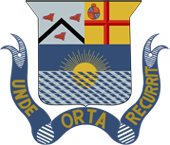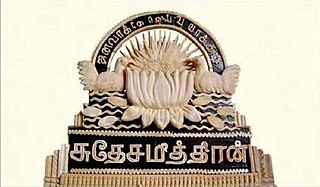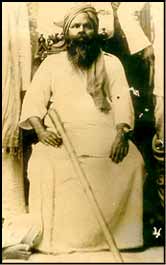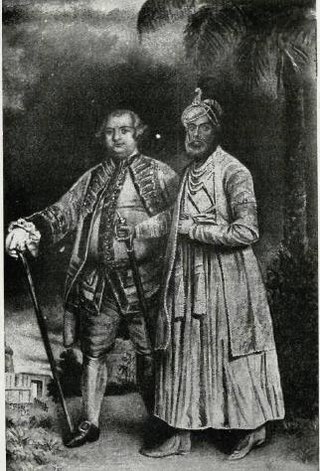
C. Subramania Bharati was a Tamil writer, poet, journalist, Indian independence activist, social reformer and polyglot. He was bestowed the title "Bharati" for his excellence in poetry. He was a pioneer of modern Tamil poetry and is considered one of the greatest Tamil literary figures of all time. He is popularly known by his mononymous title "Bharati/ Bharathiyaar," and also by the other title "Mahakavi Bharati". His numerous works included fiery songs kindling patriotism during the Indian Independence movement. He fought for the emancipation of women, against child marriage, vehemently opposed the caste system, and stood for reforming society and religion. He was also in solidarity with Dalits.

Presidency College is an art, commerce, and science college in the city of Chennai in Tamil Nadu, India. On 16 October 1840, this school was established as the Madras Preparatory School before being repurposed as a high school, and then a graduate college. The Presidency College is one of the oldest government arts colleges in India. It is one of two Presidency Colleges established by the British in India, the other being the Presidency College, Kolkata.

Swadesamitran was a Tamil language newspaper that was published from the then Madras city from 1882 to 1985. One of the earliest Tamil newspapers and the longest in print, Swadesamitran was founded by Indian nationalist G. Subramania Iyer four years after he had started The Hindu. The newspaper was sold to A. Rangaswami Iyengar of the Kasturi family in 1915 and the newspaper remained with them until its liquidation in 1985.

Seshadri Srinivasa Iyengar CIE, also seen as Sreenivasa Iyengar and Srinivasa Ayyangar, was an Indian lawyer, freedom-fighter and politician from the Indian National Congress. Iyengar was the Advocate-General of Madras Presidency from 1916 to 1920. He also served as a member of the bar council from 1912 to 1920, the law member of Madras Presidency from 1916 to 1920 and as the president of the madras province Swarajya Party faction of the Indian National Congress from 1923 to 1930. Srinivasa Iyengar was the son-in-law of renowned lawyer and first Indian Advocate-general of Madras, Sir Vembaukum Bhashyam Aiyangar. Iyengar's followers called him Lion of the South.

Vallinayagam Olaganathan Chidambaram Pillai , also known as Kappalottiya Tamizhan, was an Indian freedom fighter and a prominent leader in the Indian independence movement. He founded the Swadeshi Steam Navigation Company in 1906 to compete against the monopoly of the British India Steam Navigation Company (BISNC). He launched the first indigenous Indian shipping service between Tuticorin (India) and Colombo with the Swadeshi Steam Navigation Company (SSNC), competing against British ships. Tuticorin Port Trust, one of India's thirteen major ports, is named after him. Once a member of the Indian National Congress, he was later charged with sedition by the British government and sentenced to life imprisonment, and his barrister license was revoked.

Vanchinatha Iyer, popularly known as Vanchinathan or Vanchi, was a Brahmin and an Indian independence freedom activist. He is credited with the assassination of Robert Ashe Durai. The assassination of Robert Ashe Durai in the present-day Thoothukudi district of Tamil Nadu is a significant episode in the story of India's freedom movement. He was killed by R. Vanchinathan Iyer for his role in suppressing the Swadeshi movement in the Madras Presidency. Ashe, who was the Joint Magistrate of Thoothukudi, came to be despised by nationalists for misusing his authority to cause the downfall of the Swadeshi Shipping Company, a proud symbol of the movement in Madras. Furthermore, during the Tinnevely riots of 1908, which started due to the arrest of freedom fighters like V.O. Chidamabaram and Subramania Siva, Ashe issued the order for the police to violently assault the agitators. To avenge this brutality, the revolutionary factions decided to assassinate him, and Vanchinathan Aiyer was chosen for the task. Vanchi was an ex-forest officer who became influenced by revolutionary ideas and joined the Bharatmatha Association, founded by Neelakanta Brahmachari.

Rao Sahib Saravanapperumal Vaiyapuri Pillai was a renowned lawyer and Tamil scholar. An advocate by profession, he edited and published several Tamil classics from original manuscripts. He is best remembered as the editor of the Tamil lexicon published by the Madras University in the 1920s. He was a voracious reader and had in his own private collection thousands of books in Tamil, English, Sanskrit and Malayalam. His collection also included hundreds of palm-leaf manuscripts. This collection was later donated to the National Library of India in Kolkata. .

Subramaniya Siva was an Indian freedom fighter, writer and pure Tamil movement activist during the Indian independence movement.

Ganapathy Dikshitar Subramania Iyer was a leading Indian journalist, social reformer and freedom fighter who led the Triplicane Six in launching The Hindu, an English newspaper on 20 September 1878. He was proprietor, editor and managing director of The Hindu from 20 September 1878 to October 1898. The Tamil language newspaper 'Swadesamitran' was also founded by him in 1882.

Diwan Bahadur Sir Tinnevely Nelliappa Sivagnanam Pillai was an Indian lawyer, civil servant and politician from the Madras Presidency. He belonged to the Justice Party. He served as the Minister of Development in the government of the Raja of Panagal from 1923 to 1926.

Madras Presidency was an administrative subdivision (presidency) of British India. At its greatest extent, Madras Presidency included much of southern India, including the present-day Indian State of Tamil Nadu, the Malabar region of North Kerala, Lakshadweep Islands, the Coastal Andhra and Rayalaseema regions of Andhra Pradesh, Brahmapur and Ganjam districts of Orissa and the Bellary, Dakshina Kannada, and Udupi districts of Karnataka. The presidency had its capital at Madras.
Tamil Renaissance refers to the literary, cultural, social reform and political movements that took place in the Tamil-speaking districts of Southern India starting in the second half of the 19th century and lasting to the culmination of the anti-Hindi agitations of the 1960s.
V.T. Subramania Pillai aka V.T.S. was a scholar of Tamil music in India. He published books containing more than 1,100 songs of Thirupugal.
The Indian independence movement had a long history in the Tamil-speaking districts of the then Madras Presidency going back to the 18th century.

Ramanathapuram C. S. Murugabhoopathy, popularly referred to as CSM, was one of the most distinguished Mridanga maestros of the 20th century. He was a contemporary of Palghat Mani Iyer (1912–1981) and Palani Subramania Pillai (1908–1962). The three legends are revered as the "Holy Trinity of Mridanga".
The 1928 South Indian railway strike was a general strike by the South Indian Railway Workers Union against plans of the South Indian Railway Company to lay off over 3,100 workers in order to reduce the expenditures of the company. The strike lasted from 29 June – 2 August 1928, and severely affected the transportation of people and goods across South India. The Madras government and the South Indian Railway Company responded with a crackdown. Most of the leaders of the strike were arrested and recognition to the union was withdrawn. The Government of Madras recorded it as the "most important event of the year".

Kappalottiya Thamizhan is a 1961 Indian Tamil-language historical drama film produced and directed by B. R. Panthulu. The film stars Sivaji Ganesan, Gemini Ganesan and Savitri. It is based on the 1944 book of the same name by M. P. Sivagnanam, a biography of V. O. Chidambaram Pillai who founded the Swadeshi Stream Navigation Company to break the monopoly of the British over maritime trade out of India.
Ambujammal Desikachari née Srinivasa Iyengar (1899-1983) was an Indian independence activist and women's rights activist. A Gandhian, she participated in the Civil Disobedience Movement and served as vice-president of the Tamil Nadu Congress Committee. Ambujammal was awarded the Padma Shri in 1964.
The Swadeshi Steam Navigation Company (SSNC) was one of the first indigenous Indian shipping companies set up during the Indian independence movement. It was started in 1906 by V. O. Chidambaram Pillai to compete against the monopoly of the British India Steam Navigation Company (BISNC). It sailed ships between Tuticorin and Colombo until it was liquidated in 1911.
Vallal Pon Pandithurai Thevar, born Ukkira Pandian, also known as Pandi Durai Thevar, was the Zamindar of Palavanatham, Tamil Nadu, India. A scholar and poet belonging to the royal house of the Sethupathis of Ramanathapuram, Pandithurai Thevar contributed greatly to the revival of the Tamil language by establishing the Fourth Tamil sangam in Madurai, restoring rare Tamil texts, and becoming a patron of Tamil-language scholarship. He published the magazine Senthamizh as part of the Fourth Tamil sangam.












